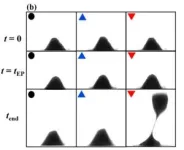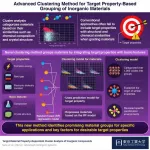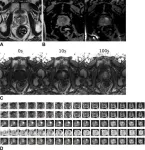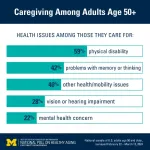(Press-News.org) Leuven, 7 August 2024—The mechanisms underlying intellectual disabilities or autism remain largely unknown. Researchers in the labs of Prof. Pierre Vanderhaeghen and Prof. Vincent Bonin at the VIB-KU Leuven Center for Brain & Disease Research and NERF have discovered that mutations in a gene called SYNGAP1 disrupt the prolonged development of human neurons, which is thought to be essential for normal cognitive function. Their work has interesting implications for our understanding and treatment development for intellectual disabilities or autism and appears in Neuron.
The human brain is notable among mammals for its remarkably prolonged development. Unlike in other animals, neurons in our brain, particularly in the cerebral cortex–the primary site of cognitive functions–take years to fully mature. This process, known as neoteny, is thought to be critical for developing some of the advanced cognitive functions characteristic of our species. Disruptions in this prolonged development could underlie some forms of intellectual disability and autism. Until now, this hypothesis had never been tested in human neurons.
A window into the maturing brain
Introducing the gene SYNGAP1. Previous studies found that mutations in this gene are a major cause of these conditions. However, the specific effects of its disruption on human cortical neurons remained largely unknown. Until recently, a major obstacle in studying human brain developmental diseases was the lack of reliable experimental methods to observe human cortical neuron development in a living brain.
Now, scientists at the VIB-KU Leuven Center for Brain & Disease Research and NERF (Neuro-Electronics Research Flanders, empowered by imec, KU Leuven, and VIB) have revealed that SYNGAP1 is crucial for the prolonged developmental timeline of human cortical neurons. This establishes a link between acceleration of neuronal development and intellectual disability and autism.
To investigate how the SYNGAP1 mutation affects human neuron development in vivo, the researchers used a xenotransplantation model: they grafted human neurons with the SYNGAP1 mutation into the brains of mice and subsequently studied their development and function.
Faster is not better
The researchers examined the effects of the mutation of transplanted human neurons in the mouse brain at the circuit level—connections between neurons that serve specific functions in the brain.
“We saw that the SYNGAP1 mutant neurons looked normal in most aspects, but that they displayed a strong acceleration of their development. Most strikingly, they connected much faster with other neurons,” explains Dr. Ben Vermaercke, first author of the paper.
In particular, Dr. Vermaercke and his colleagues discovered that the deficient neurons integrated faster into cortical circuits and responded to visual stimuli months ahead of the normal developmental schedule, indicating that the faster maturation of the neurons led to precocious functionality of the neurons within brain circuits.
Prof. Pierre Vanderhaeghen adds: “This accelerated development of SYNGAP1 mutant neurons could alter the early function and plasticity of infant brain circuits, although this needs to be studied further by experimental and clinical investigations. The important role of neoteny for normal human brain development highlights how its disruption can lead to neurodevelopmental diseases. Early defects in the development of human cortical neurons could have important implications for the diagnosis and treatments of the patients affected by SYNGAP1, and potentially in patients presenting other forms of intellectual disability or autism.”
Professor Vincent Bonin concludes: “The transplantation model we developed enables, for the first time, the study of human neuronal diseases in vivo at both the functional and circuit levels. This breakthrough constitutes a promising model for understanding neurological diseases and testing new treatments.”
—
Publication
SYNGAP1 deficiency disrupts synaptic neoteny in xenotransplanted human cortical neurons in vivo. Vermaercke, Iwata, et al. Neuron, 2024. DOI: xxx
Funding
The research (team) was supported by the Research Foundation Flanders (FWO), Grants of the European Research Council (NEUROTEMPO), the Foundation GENERET, the C1 KU Leuven Internal Funds Programme, the EOS Programme, ERANET EPINEURODEVO, NSC-Reconstruct and the Belgian Queen Elizabeth Foundation.
END
When faster is not better: New study links premature development of human neurons to brain developmental disorders
2024-08-06
ELSE PRESS RELEASES FROM THIS DATE:
Meteorin-like protein drains energy from T cells, limiting immune system’s power to fight cancer
2024-08-06
**EMBARGOED FOR RELEASE UNTIL AUG. 6 AT 11 A.M. ET**
A protein called Meteorin-like (METRNL) in the tumor microenvironment saps energy from T cells, thereby severely limiting their ability to fight cancer, according to new research directed by investigators at the Johns Hopkins University School of Medicine and the Johns Hopkins Kimmel Cancer Center and its Bloomberg~Kimmel Institute for Cancer Immunotherapy. Finding ways to block the effects of METRNL signaling on tumor-infiltrating T cells may allow these immune cells to regain the energy necessary to eliminate tumors.
A report about the work was published Aug. 6 in the journal Immunity.
METRNL ...
Live longer, die healthier
2024-08-06
Everyone wants to live to a ripe old age, but no one wants to be decrepit. Now, University of Connecticut researchers have demonstrated a treatment that could lengthen life—and vigor—up to the very end.
Even as human lifespans have lengthened over the past century, most people in old age suffer a serious health decline in the last decade of life. Chronic illnesses such as cancer, diabetes, or cardiovascular disease may begin, followed by frailty. Many interventions can prolong life, but not necessarily good health. And nobody wants to spend the last ...
Novel machine learning-based cluster analysis method that leverages target material property
2024-08-06
In materials science, substances are often classified based on defining factors such as their elemental composition or crystalline structure. This classification is crucial for advances in materials discovery, as it allows researchers to identify promising classes of materials and explore new ones with similar functions and properties. A recent Advanced Intelligent Systems study led by Researcher Nobuya Sato and Assistant Professor Akira Takahashi from Tokyo Institute of Technology developed a new machine learning-powered clustering technique. This technique groups similar materials by taking into account both their ...
CT health screening can identify diabetes risk
2024-08-06
OAK BROOK, Ill. – Analysis of CT scans in people who undergo imaging for health screening can identify individuals at risk of type 2 diabetes, according to a study published today in Radiology, a journal of the Radiological Society of North America (RSNA). Researchers said the findings underscore CT’s value in opportunistic imaging—the use of information from routine imaging examinations to learn more about a patient’s overall health.
For the new study, researchers evaluated the ability of automated CT-derived markers ...
AI model effective in detecting prostate cancer
2024-08-06
OAK BROOK, Ill. – A deep learning model performs at the level of an abdominal radiologist in the detection of clinically significant prostate cancer on MRI, according to a study published today in Radiology, a journal of the Radiological Society of North America (RSNA). The researchers hope the model can be used as an adjunct to radiologists to improve prostate cancer detection.
Prostate cancer is the second most common cancer in men worldwide. Radiologists typically use a technique that combines different MRI sequences (called multiparametric MRI) to diagnose clinically significant prostate cancer. ...
Exposure to wildfire smoke may affect patients undergoing surgery
2024-08-06
CHICAGO – Nearly 100 wildfires are currently raging throughout the country, burning more than 2 million acres. The rising frequency of these fires poses a special concern for anesthesiologists – the potential for increased rates of adverse outcomes from anesthesia and surgery among patients exposed to wildfire smoke, according to a special article in the Online First edition of Anesthesiology, the peer-reviewed journal of the American Society of Anesthesiologists (ASA).
"Wildfire smoke causes inflammation and is known to worsen heart and lung disease and pregnancy outcomes," said senior author Vijay Krishnamoorthy, M.D., M.P.H., Ph. D., chief of the Critical Care ...
Visiting an art exhibition can make you think more socially and openly. But for how long?
2024-08-06
A new study by an international team of collaborators led by researchers at the University of Vienna, and in collaboration with the Dom Museum Wien, aimed to address the questions of whether art exhibitions can make us more empathic or even change our attitudes and behaviors? The researchers were able to show that, indeed, looking through the exhibition reduced xenophobia and increased acceptance of immigration. Even more, by employing a new cellphone-based experience sampling method, they could track how long ...
Heating for fusion: Why toast plasma when you can microwave it!
2024-08-06
Some believe the future of fusion in the U.S. lies in compact, spherical fusion vessels. A smaller tokamak, it is thought, could offer a more economical fusion option. The trick is squeezing everything into a small space. New research suggests eliminating one major component used to heat the plasma, freeing up much-needed space.
Scientists at the U.S. Department of Energy’s (DOE) Princeton Plasma Physics Laboratory (PPPL), the private company Tokamak Energy and Kyushu University in Japan have proposed a design for a compact, spherical fusion pilot plant ...
Nudges fail to motivate vaccination
2024-08-06
One popular strategy to motivate people to get vaccinated is the nudge—a message designed to take advantage of human tendencies to conform to social norms, seek to protect loved ones or community, and to prefer treatments with high efficacy rates. Jiseon Chang and colleagues sought to assess the efficacy of such nudges in real world contexts during the COVID-19 pandemic. The authors paid for ads to appear on Facebook between October 2021 and January 2022, reaching almost 15 million users in Brazil, Russia, South Africa, Taiwan, ...
Caregiving: Poll reveals who’s providing care and who they’re caring for
2024-08-06
More than 1 in 4 people age 50 and older helps take care of at least one family member or friend who has a health problem or disability, a new poll finds.
And among those caregivers, the new results from the University of Michigan National Poll on Healthy Aging reveal a lot about who they are and who they’re caring for.
In all, 30% of all people in their 50s and early 60s provide care to at least one person with a health issue or disability, compared with 23% of people over 65. And 1 in 10 caregivers in their 50s and early 60s are juggling taking care of three or more people.
In ...








